

 |
 |
|
 |

|
| About Us |
|
Read Past Issues | Resources | Composer Links |
|
MUSIC NEWS
|
They
usually do it in the dark. They usually do it from memory and they
What made this
concert in the Kimmel Center's Fresh Ink series of
Short rapid
notes and sounds show up the percussiveness of even the flute,
Another premiere
by a local composer, David Ludwig's "Haiku Catharsis"
"Les Moutons
des Panurge" (1969) by Frederic Rzewski was introduced by an
The program
was completed with "Critical Moments 2" (2001) by George Perle,
eighth blackbird
Old Stuff An Interview with Tobias Picker Handmaid Tale's Debuts in English Rautavaara Joins B&G Who's Afraid of Julia Wolfe Derek Bermel's Soul Garden The Pianist: The Extraordinary True Story of Wladyslaw Szpilman John Adams' Atomic Opera A Bridge Not Far Enough Turnage Signs With B&H Sophie's Wrong Choice Copland's Mexico On Being Arvo Rzewski Plays Rzewski Praising Lee Hyla David Lang's Passing Measures
|
|||||||||||||||||||
Different Trains Composer: Steve Reich David Robertson, Orchestre National de Lyon Naive This
is a new version of Reich's haunting 1988 masterpiece (the
original used four string quartets--both pre-recorded and live) prepared
for 48 strings by the composer at the suggestion of the conductor
David Robertson. The result further enhances the lyricism and emotional
impact of this powerful piece, which contrasts the trains that young Reich
rode across the United States to visit his divorced parents in the 1940s
with the trains of Nazi Germany during the same period.
It is coupled with two other major scores by Reich: Triple
Quartet (1999) for 36 strings, and The Four Sections (1986), a "concerto
for orchestra" that highlights each of the sections of the large symphony
orchestra in turn
|
Symphonies 2 & 3 Composer: Philip Glass Marin Alsop, Bournemouth Symphony Orchestra Naxos Marin
Alsop conducts the Bournemouth symphony orchestra in extraordinary performances
of Glass' Second and Third symphonies. The Second was comissioned
by the Brooklyn Acadamy of Music and premiered there in 1994 by Dennis
Russell Davies. The Third, which arrived only three years later,
is composed for chamber orchestra. Lots of polyharmonies,
rousing finales, and fully-formed symphonic statements. Essential listening
for anyone interested in contemporary music.
|
Nuit des Hommes Composer: Per Nørgård Markus Falkbring, viola Helene Gjerris, mezzo-soprano Andreas Hagman, violin Kaare Hansen, conductor Fredrik Lindström, cello Helge Rønning, tenor Bodil Rørbech, violin Gert Sørensen, percussion DaCapo First performed in 1996, Nørgård called this "… an opera of sorts …" Whatever it is, it is both radical and powerful. Two singers, male and female, take on three roles each, as well as chorus, over the course of 65 minutes, augmented by two violins, viola, cello and percussion doubling electronic keyboards. The text comes from Guillaume Apollinaire's surreal and emotionally-charged poetry inspired by the atrocities of World War, which also inspired Shostakovich in his Fourteenth Symphony. Raw and riveting. |
The Chamber Music of Aaron Copland Performers: Music From Copland House Michael Boriskin, Paul Lustig Dunkel, ensemble co-directors, Derek Bermel, clarinet, Michael Boriskin, piano, Paul Lustig Dunkel, flute, Nicholas Kitchen, violin, Wilhelmina Smith, cello Arabesque Music From Copland House is the resident ensemble at Aaron Copland's longtime New York home, now restored as a unique creative center for American music. Since its triumphant New York debut at the Opening Night of Merkin Concert Hall's 1999-2000 season, Music from Copland House has emerged as one of the most exhilarating and distinctive ensembles on the American music scene. In this beautifully played two CD set, they return to their roots--the extraordinarily rich chamber pieces of Aaron Copland, who would have been 104 on November 14. This disk is a real sleeper. |
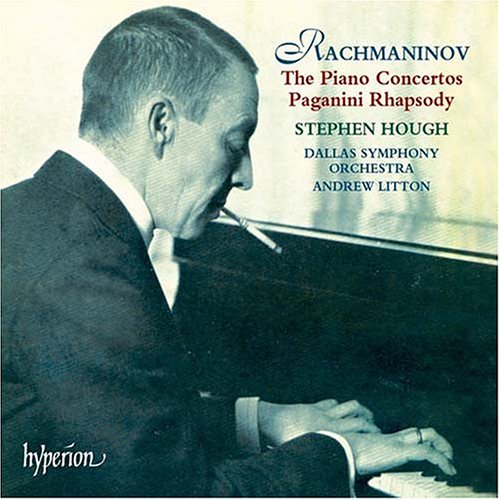
The Piano Concertos, Paganini Rhapsody Composer: Sergei Rachmaninov Stephen Hough (piano), Dallas Symphony Orchestra, Andrew Litton Hyperion You
may find better individual performances of each of Rachmaninov's four
piano concertos (Leif Ove Ondnes's No, 3, for example) but this 2-disk
set is hard to beat as a one-stop listening experience. Cobbled together
from 11 live performances over an 18-day period, the power chord, big sound,
sweeping Rachmaninov romanticism has never sounded, well, bigger or more
romantic. Littton is a Rocky Romantic Show specialist and it
shows in the orchestra's splendid melding with Hough's oversized playing.
Highly recommended, even if you already have them all.
|
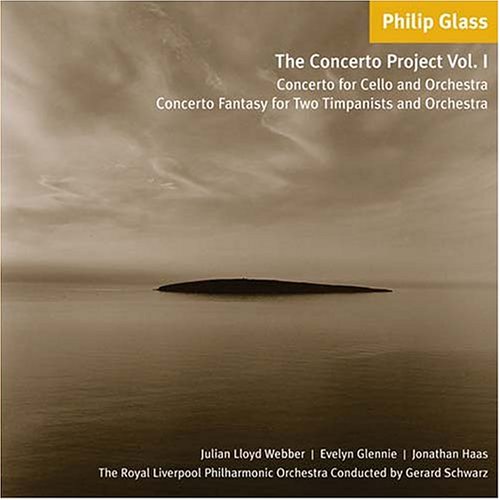
The Concerto Project 1 Composer: Philip Glass Cello Concerto, Concerto Fantasy for Two Timpanists and Orchestra Julian Lloyd Webber (cello), Evelyn Glennie (timpani), Jonathan Haas (timpani), Royal Liverpool Philharmonic Orchestra, Gerard Schwarz Orange Mountain Every
shard of Glass seems to finding its way onto a CD nowadays and it's getting
harder to tell the major Glass from the--forgive me--half Glass.
This is major Glass. The Cello Concerto is a real beauty, played
with real passion by Lloyd Webber and the RLP. The timpani concerto
is great, too, once you get past the thought that maybe Phil borrowed the
opening from Lalo Schifrin. This is the first of a series of four
CDs that Philip Glass and Orange
|
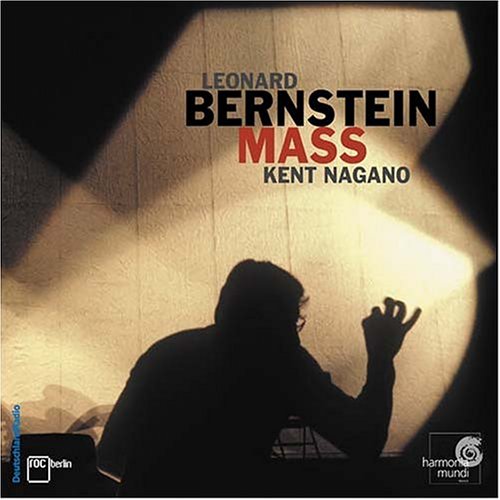
Mass - A Theatre Piece for Singers, Players & Dancers Composer: Leonard Bernstein Jerry Hadley (tenor), Rundfunkchor Berlin, Paci. c Mozart Ensemble, Staats-und Domchor Berlin, Deutsches Symphonie- Orchester Berlin, Kent Nagano harmonia mundi What's
a nice Jewish boy like Leonard Bernstein doing writing a Mass? In
this case, he was invited to do so by Jacqueline Kennedy for the opening
of Kennedy Center in 1971. This is Lennie at his most flamboyant,
employing a big theatrical cast, mixed chorus, children’s choir, dancers
and a rock band. The libretto for Mass intersperses texts written
by Bernstein and Stephen Schwartz (lyricist for Godspell) into the Roman
Mass. The work explores the mass from the point of view of the Celebrant
(sung by Jerry Hadley), who is experiencing a crisis of faith. The Celebrant’s
faith is simple and pure at first, yet that faith gradually becomes unsustainable
under the weight of human misery, corruption, and the trappings of human
power. In the end, the Celebrant, on the verge of renouncing
|
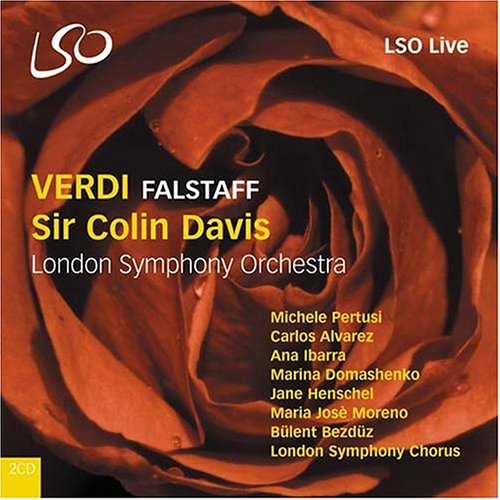
Falstaff Composer: Guiseppe Verdi Michele Pertusi (bass), Carlos Alvarez (tenor), Ana Ibarra (soprano), Marina Domashenko (mezzo-soprano), Jane Henschel (mezzo-soprano), Maria Josè Moreno (mezzo-soprano), Bülent Bezdüz (tenor), London Symphony Orchestra & Chorus, Sir Colin Davis LSO Live Hot
on the heels of their highly acclaimed recording of Britten’s Peter
Grimes, Sir Colin Davis and the London Symphony Orchestra are joined by
a magnificent cast led by Michele Pertusi for a spectacular performance
of Verdi’s comic masterpiece, Falstaff.
|
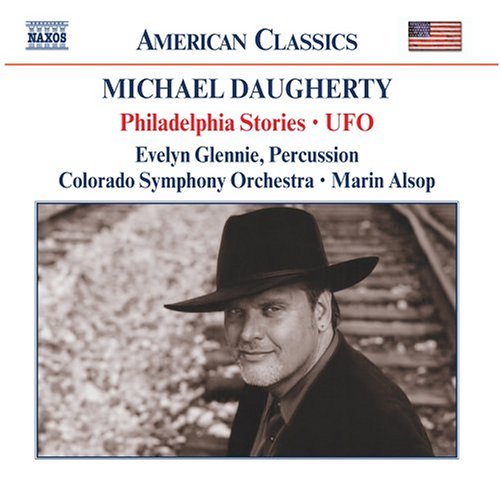
Philadelphia Stories / UFO Composer: Michael Daugherty Performers: Evelyn Glennie, percussion / Colorado Symphony Orchestra / Marin Alsop, conductor Naxos Something
of a coup for Naxos’ American Classics series matching world famous percussionist
Evelyn Glennie with Gramophone Artist of the Year Marin Alsop and the Colorado
Symphony Orchestra with one of America's most intriquing composers.
Daugherty has the uncanny ability to be all things to all listeners without
seeming to comprise either seriousness or an enjoyable listening experience.
|
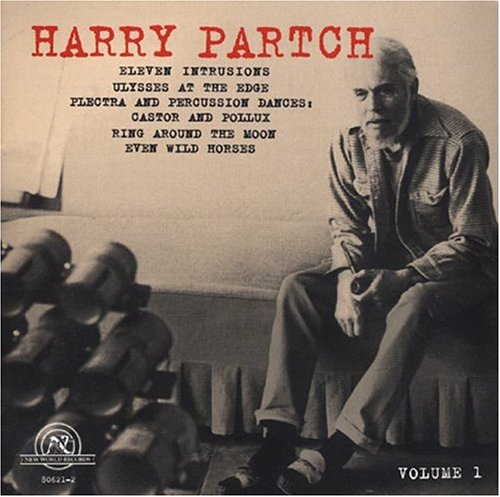
Orchestral Works Composer: Harry Partch Performer: Johnston, Pippin, et al. New World Records These works span the first six years of what American maverick composer Harry Partch (1901–1974) called the "third period" of his creative life. They show him moving away from the obsession with "the intrinsic music of spoken words" that had characterized his earlier output (the vocal works of 1930–33 and 1941–45) and towards an instrumental idiom, predominantly percussive in nature. The Eleven Intrusions are among the most compelling and beautiful of Partch’s works. The individual pieces were composed at various times between August 1949 and December 1950, and only later gathered together as a cycle. Nonetheless they form a unified whole, with a nucleus of eight songs framed by two instrumental preludes and an essentially instrumental postlude. |
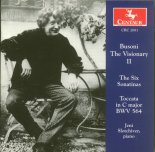
Busoni the Visionary, Volume II Jeni Slotchiver, piano Centaur No one plays Busoni's piano music with greater clarity or depth of understanding than Jeni Slotchiver. As she demonstrated in Volume I of this series, this is music she clearly loves and understands both intellectually and intuitively. There is no finer, or more committed, advocate for this greatly underrated composer working today. See Slotchiver's notes on Busoni the Visionary here. |
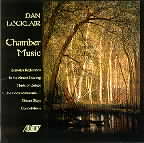
Chamber Works Composer: Dan Locklair Albany Records Dan
Locklair is an organist by trade and although he has written a wide body
of works--his prolific output includes symphonic works, a ballet, an opera
and numerous solo, chamber, vocal and choral compositions--one may be forgiven
for identifying him first with that glorious instrument. These chamber
works show that Locklair's command of musical language is far broader
and deeper than a single instrument. These fresh and engaging
works are musically challenging and yet a real treat for the ear.
|
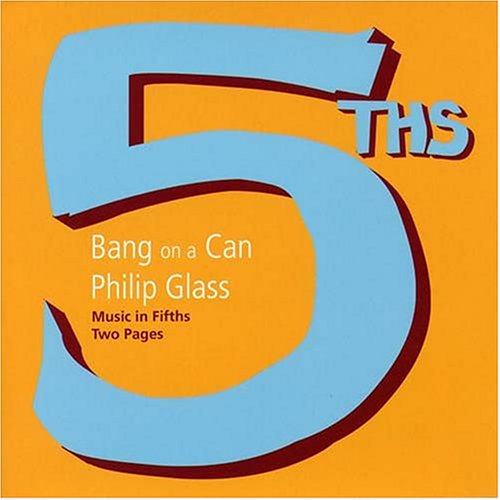
Music in Fifths/Two Pages Composer: Phillip Glass Performer: Bang on a Can Cantaloupe These are transcriptions of two early Glass works ("Fifths," originally performed and recorded by Philip Glass with Jon Gibson and Dickie Landry in the original version for saxophones and electric organ) and ("Two Pages", originally done by Philip Glass on electric organ and Michael Riesman on piano). As always the Bang on a Can All Stars do a... well... bang up job and bring a fresh perspective to two of the seminal works of Glass' early career.
|
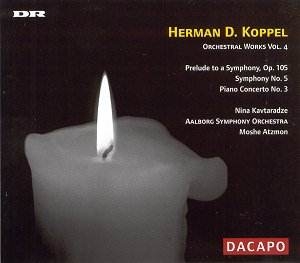
Orchestral Works Composer: Herman D. Koppel Nina Kavtaradze (piano) Aalborg Symphony Orchestra/Moshe Atzmon DACAPO This is the third volume of the symphonies of the Danish composer Herman D Koppel who lived from 1908 to 1998 and wrote seven symphonies between 1930 and 1961. Born in Copenhagen the son of Polish Jewish immigrants, Koppel fled to Sweden during World War II and his Symphony No. 3, written there, is an intensely personal work that mirrors the fears and anxieties of that period. No. 5 is more hopeful and steady but lacks the raw energy of the 3rd. |
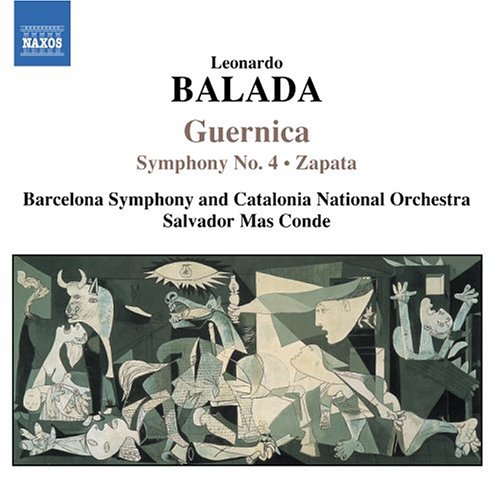
Guernica, Symphony no 4, Zapata Composer: Leonardo Balada Barcelona Symphony and Catalonia National Orchestra/Salvador Mas Conde Balada’s Guernica, completed in 1966, during the height of the Viet Nam War, was inspired by Picasso’s large-scale mural of 1937, which has come to represent a protest piece against all wars. Balada writes in a personal modern idiom, although there are traces of his apprenticeships with Dello Joio and Aaron Copland. Neither a serialist nor neo-classisist Balada is modern in ways that are highly individual and sometimes hard to follow. But, he's an original and a little patience from the listener is well worth the effort. |

Symphonies Nos: 4, 5, 6 Composer: Josef Tal NDR RadioPhilharmonie/Israel Yinon CPO German-born
Israeli composer Josef Tal, whose work I had never heard from this CD,
is said to have derived his musical style from the second Viennese
school and has remained an unrepentant modernist. He has also been an innovator
and pioneer, one of the first to combine a live instrument with a studio-generated
tape recording; he founded the Israel Center for Electronic Music and imported
the first Moog Synthesizer into his adopted country. These three symphonies
reveal a composer with a strong personal voice working at the height of
his powers. Very powerful.
|
 |
Search WWWSearch www.sequenza21.com |
